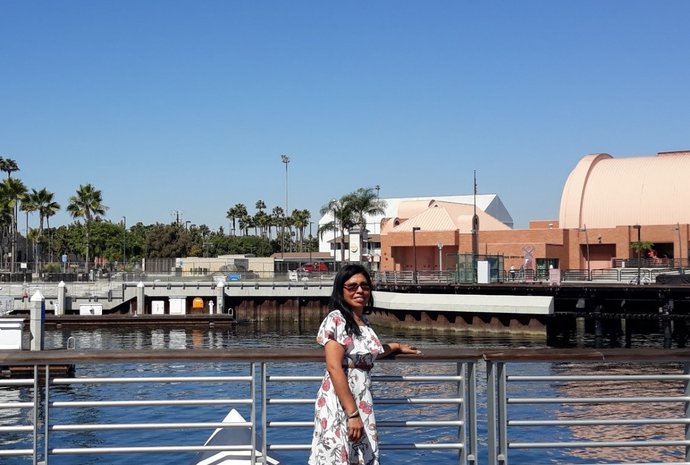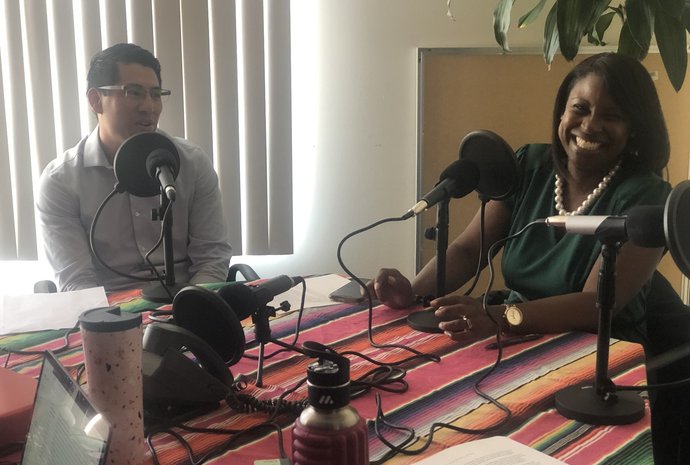Financial Opportunity Centers Provide Community Pandemic Relief Amid Increasing Inequalities
In a map of average income in Los Angeles, the city appears like a patchwork. Low income households cluster in downtown, South and East LA, while high income households line their periphery. This pattern reveals not only a geographic but demographic inequality. Low income areas are also areas with concentrations of people of color, while high income areas are home to majority non-hispanic whites. Looking at the city from a bird’s-eye view, a history of stringent and discriminatory zoning policies and the exploitation of immigrant and Black labor are apparent in the very geographic fabric of Los Angeles.
Since the pandemic hit in early 2020, these inequalities have been dramatically amplified. Low income and communities of color are at higher risk, in terms of both their physical and financial health. Neighborhoods like Westlake and Pico-Union (low-income areas of the LA map) have become COVID-19 red zones, while coastal areas on the wealthier periphery remain relatively under control. Many of our partners are deeply in touch with these high-risk communities, making us poised to deploy immediate pandemic relief in a critical time. In fact, since early 2020, we have been working with key partners at LA-based Financial Opportunity Centers and Bridges to Career Opportunities Centers to respond when it has been needed most.
Financial Opportunity Centers, or FOCs, are a network of on-the-ground centers that work with low-income individuals, families, and communities at large to provide integrated financial services. These include a series of programs such as employment advancement, income enhancements, and financial capabilities and asset building programs that help individual clients and households achieve financial stability. Bridges are often built into FOCs and provide training and credential programs to combat an existing skills gap. LISC LA supports three FOCs in the Los Angeles area: Montebello-based Mexican American Opportunity Foundation, South LA’s Coalition for Responsible Community Development, and Central City Neighborhood Partners servicing Pico-Union, Westlake, and McArthur Park.
When the pandemic hit, the FOCs were already well-positioned for supporting those most affected by the pandemic: low-income communities and communities of color. However, as unemployment skyrocketed and health risks boomed, FOC’s long-term, capacity-building programs were not enough to provide relief from the immediate impact the pandemic was having on their clients. Direct relief efforts were desperately needed as employers closed their doors and the economy came to a halting stand still.
Over the following months, LISC LA has provided $100,000 in funding for FOCs to distribute to their clients in local communities. This funding has served as a critical lifeline for clients experiencing economic uncertainty and struggling to meet their basic needs, especially those who entered a waiting game for governmental help such as undocumented immigrants. Angeleno Cards also made up significant relief efforts which FOCs helped to distribute to their existing base of clients. The Angeleno Cards quickly deployed assistance to low-wage workers including those who “had jobs in homes and restaurants, seasonal workers, and other workers such as day laborers, street vendors, or self-employed individuals” who were facing increased financial hardship.
The rapid response of Financial Opportunity Centers with food banks and essential needs, LISC LA relief funding, and Angeleno Cards is a reminder of the importance of these community organizations in times of need. As FOC’s work to combat existing inequalities, they build ties to historically disinvested neighborhoods that position them for a key role in rapidly and effectively servicing the community, especially during times of crisis. LISC LA believes that partners such as Financial Opportunity Centers should not only be viewed as service providers for particular communities but integral to our city’s infrastructure as we move into the future.
As our efforts in this area become more and more important, they would not be possible without the support of such sponsors as Pacific Western Bank who make investing in our communities a priority.


